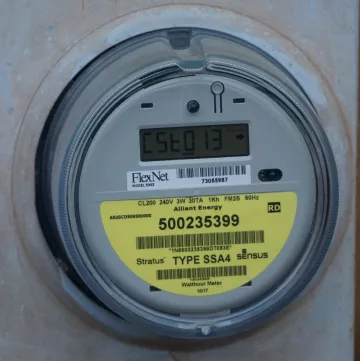The retirement of the Muscatine coal plant marks a significant turning point; residents deserve a voice in planning for its replacement
By Katie Rock
In June, Muscatine Power and Water publicly shared study results recommending the retirement of the 270 MW municipal coal plant in Muscatine. The study proposes retiring all coal units by 2022 and replacing two units with 30 MW of solar and the largest third unit with a new gas plant. Sierra Club supports the retirement of the MPW coal plant ahead of 2030, preferably as soon as is economically feasible while providing a fair transition for its employees. We believe MPW should reject the proposal to build a gas burning unit, and instead the plant should be replaced fully with renewable energy using a mix of solar, storage, wind, demand response and energy efficiency.
The potential retirement of the MPW coal plant marks a significant turning point for Muscatine. Sierra Club submitted public comments at the most recent MPW Board of Trustees meeting to share what we support, where we have questions, and what we hope to see from the Board of Trustees as they weigh this decision.
Climate and energy experts are forming a growing consensus that switching from coal to gas is not a climate solution. Extracting fracked gas releases methane into the atmosphere. Methane is a greenhouse gas that traps more heat than carbon dioxide, though it also breaks down more quickly than CO2. Experts agree that methane is 30 to 80 times more potent than carbon dioxide, and that’s not a good thing.
Burning fracked gas for power produces greenhouse gases, too. While burning coal continues to be the most environmentally dangerous source of electricity, burning fracked gas is not a source of “clean” energy, especially when compared to renewable sources like wind or solar.
Sierra Club opposes the construction of new fracked gas plants. The science is clear that if we replace coal plants with gas plants, we will fail to avert the worst impacts of climate change. But it’s not just climate impacts that make gas a bad deal: an investment in a sizable gas burning unit will likely be stranded by clean energy within 5 to 10 years of that gas being built, and that should weigh heavily into the board’s decision. A recent paper by the Rocky Mountain Institute examined 88 proposed gas plants around the country and found that 90% of them would provide electricity that costs more than if the utilities instead invested in wind, solar and energy efficiency. Given that the engineering life of a gas plant is 30-40 years, that means that Muscatine residents will be left footing the bill when they could be saving money with lower cost clean energy.
We also have some questions about MPW’s process that led it to the conclusion that a new gas plant was in customers’ interests. The public deserves an opportunity to weigh in on this proposed replacement of one fossil fuel with another. This is a major decision that will take decades to pay off. The community deserves a process that allows for their voices to be heard. We ask MPW to set a timeline for public input, including public hearings, over the next several months around this proposal.
Our first question was: what is the value of the steam MPW sells, and to whom is it sold? Does the steam contract set to expire at the end of 2022 need to be replaced?
Second, the presentation from the Leidos Engineering study indicates MPW is 90 MW over capacity, which is more than 50% of the 160 MW needed. Why is MPW so overcapacity? Is it related to the need for steam or heat for industrial customers?
Third, is the cost to replace unit 9 with gas worth the short lifetime of a gas plant? Our initial estimates figure a gas plant replacement would have a 5 to 10 year lifetime before becoming stranded if built in 2028. In other words, within 5-10 years of building the plant, MPW would be in the position of realizing renewable resources could provide electricity at lower cost, but customers will still be stuck with a gas plant that has not been paid off yet. Investing in energy efficiency and demand response along with renewables is what makes the difference between stranding the asset in 10 years or 5 years. Alliant Energy recently demolished a converted gas plant in Clinton 6 years early. Alliant’s Burlington coal plant is set to either be converted to gas or retire by the end of 2021. How is the high cost of conversion to gas balanced against the risk of early retirement?
In response, the board voiced the steam contract is not expected to be renewed once it expires in 2022, and what has been shared publicly from the Leidos Engineering study is the first phase in a multiphase process to transition the plant from coal power.
Gas is not coal’s cleaner cousin, it’s just another expensive and dirty fossil fuel. The climate-disrupting impacts of methane and carbon dioxide emitted by extraction, transport, and burning contribute to the climate crisis and clearly point to the urgent need to keep fossil fuels in the ground. Meanwhile the cost of renewable energy from wind and solar power continues to drop. Investing in renewables creates sustainable, family-supporting jobs that are already part of a booming industry in Iowa. MPW has decided that gas is in the public’s best interest, but the facts don’t seem to add up and there hasn’t been any opportunity for the public to way in on the process. Muscatine deserves better. Muscatine deserves a voice.
